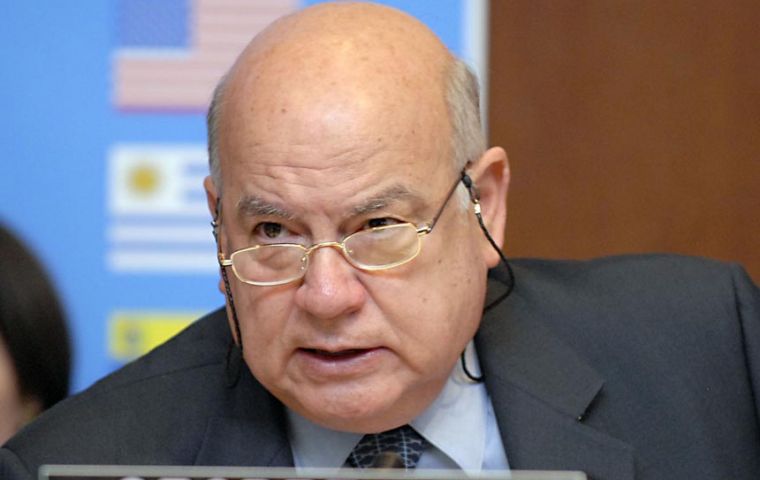MercoPress. South Atlantic News Agency
Insulza bids for a second OAS term; US and Venezuela are not convinced
 OAS Secretary General Jose Miguel Insulza apparently has ample support
OAS Secretary General Jose Miguel Insulza apparently has ample support The Secretary General of the Organization of American States (OAS), José Miguel Insulza, on Wednesday presented his candidacy for re-election in a speech before the Permanent Council in which he offered to continue to be a “partner” in the use of a “modern multilateralism to apply our common agenda, as ambitious as it may be, for the benefit of the people of the Americas.”
Secretary General Insulza summarized the achievements of his first term in office, presented his vision of his second term and requested the support of all Member States.
With his sights on the future, the Secretary General urged the strengthening of multilateralism into something “broad, modern and inclusive.”
“I don’t want the multilateralism of the Cold War, characterized by confrontation, or a supranational OAS that travels to countries to impose solutions or teach lessons. That style, which is proper of those nostalgic of the Cold War, has been buried, is in the past, and has no place in this Organization.”
Insulza named the European Union as an example of “modern multilateralism” and asked for a commitment from “our countries to common standards in matters of democracy, human rights, security and development” and to the creation of “networks and mechanisms that support them”.
Furthermore, the Secretary General called attention to the need for “the inter-American system of human rights, made up of the Commission, the Court and the Inter-American Institute of Human Rights to have at its disposal the capabilities and resources required to carry out its tasks, and we must try to make its decisions be recognized and obeyed by all.”
Secretary General Insulza mentioned the role played by the OAS in various conflicts in the last five years: its mediation in the political institutional crisis of Nicaragua in 2005; its role in the “democratic transformation” of Bolivia; its special mission of assistance to the electoral process and institutions in Haiti; its support for the reestablishment of the Supreme Court of Justice of Ecuador in 2005 and the process of constitutional reform in 2007-2008; its mediation in the territorial differences between Belize and Guatemala; its important role in the crisis between Colombia and Ecuador that broke March 1st, 2008; its Mission to Support the Process of Peace in Colombia (MAPP/OEA); its lifting of the 1962 Resolution to exclude Cuba from the Organization; its initiatives in the political crisis in Guatemala in 2009; and the political crisis in Honduras.
With respect to Honduras, the Secretary General urged countries to “reach the appropriate conclusions” from the crisis. “The multilateralism of today has its limits,” he said. “Our legal tools are the most powerful in the region today. In this case, however, they were not invoked in time. We rely on the executive power’s request to act.”
The positions of OAS Secretary General and Assistant Secretary General for the next five years will be filled during a Special General Assembly election to be held March 24 at the Organization’s headquarters in Washington, DC.
Insulza needs the support of at least 17 of the 33 country members (Honduras is suspended and Cuba refused an invitation to return to OAS). Apparently he has sufficient votes in South America and the Caribbean countries which add to 15 votes.
However Peru has said “a renovation” of the OAS Secretary General figure would be positive and the ALBA countries led by Venezuela are not convinced with Insulza whom they claim is “too submissive” to Washington.
Furthermore the White House has refused to reveal its plans (and candidate) and the Foreign Relations Committee from the Senate endorsed earlier this year a scathing report (Multilateralism in the Americas: let’s start by fixing the OAS) of Mr. Insulza’s performance particularly regarding the democratic charter of the organization and his personal political ambitions.




Top Comments
Disclaimer & comment rulesCommenting for this story is now closed.
If you have a Facebook account, become a fan and comment on our Facebook Page!